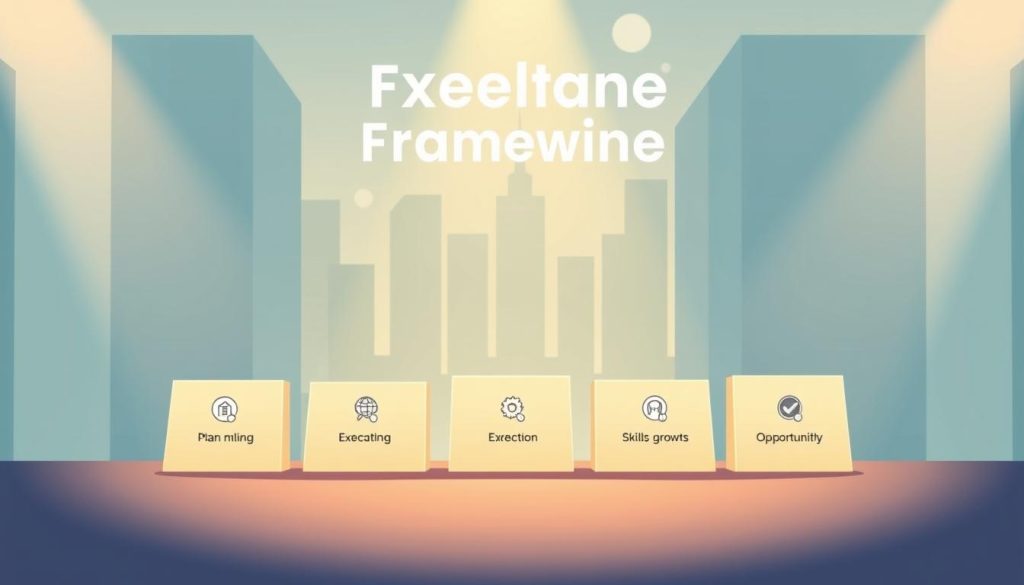What if everything you’ve heard about freelancing limiting your professional growth is wrong? For self-employed professionals, career advancement isn’t about climbing corporate ladders—it’s about rewriting the rules. Unlike traditional roles, freelancers build their own paths through deliberate strategies that blend skill mastery with entrepreneurial vision.
Freelancing offers unmatched flexibility, but it also demands a unique approach to growth. Success hinges on expanding your client network, refining niche expertise, and creating systems that ensure steady income. While corporate jobs provide structure, independent professionals craft their progression through specialized skills, strategic pricing, and long-term client partnerships.
Consider this: doubling your rates or landing recurring contracts can transform your trajectory faster than annual promotions. The key lies in balancing technical excellence with business savvy—like learning to explore high-value freelance projects that align with your evolving strengths. This isn’t just work—it’s building an asset that grows with you.
Table of Contents
Key Takeaways
- Freelancer advancement focuses on client diversification and rate optimization
- Specialized expertise increases earning potential by up to 50%
- 70% of freelancers value autonomy over traditional career paths
- Multiple income streams create financial stability
- Business skills are as critical as technical abilities
Understanding Career Progression for Freelancers
Freelancing reshapes how we measure success. Unlike office jobs with predefined milestones, self-directed professionals craft unique benchmarks through client impact and skill evolution.
Redefining Success Metrics
Your advancement now depends on three pillars:
- Skill diversification – Mastering complementary abilities like project budgeting
- Client outcomes – Measured through repeat contracts and referrals
- Industry authority – Publishing case studies or speaking at events
Thriving in Dynamic Markets
French freelancers face unique challenges with gig economy fluctuations. Building adaptive resilience helps you:
- Pivot services during slow seasons
- Negotiate retainers for stable income
- Identify emerging client needs early
Investing in business training often yields 3x returns through smarter pricing and client selection. As one Paris-based designer notes: « My breakthrough came when I stopped chasing projects and started cultivating partnerships. »
Identifying Skills and Qualifications for Freelance Success
Skills aren’t just what you do—they’re your currency in the freelance economy. The right combination turns projects into partnerships and clients into long-term collaborators. To thrive, you need a strategic mix of technical precision and human-centered abilities that adapt to market shifts.
Enhancing Technical and Soft Skills
Top performers balance niche expertise with versatile problem-solving. A web developer might master AI integration tools while sharpening client negotiation techniques. This dual focus helps:
- Increase project rates by 30-50%
- Reduce miscommunication delays
- Build referral networks organically
One Marseille-based designer shared: « Learning to articulate design choices tripled my repeat clients—it’s not just about pixels anymore. »
The Role of Continuous Learning
Market leaders dedicate 5-10 hours monthly to skill upgrades through ongoing training programs. Effective learning strategies include:
- Quarterly workshops on emerging tools
- Micro-courses for specific client needs
- Peer skill swaps with other freelancers
A Lyon copywriter reported: « Mastering SEO analytics tools let me charge premium rates while keeping clients for 3+ years. » Your development plan should evolve as fast as your industry—or faster.
Building a Strong Freelance Foundation
Your freelance journey thrives on intentional preparation. Unlike traditional employment, independent success demands custom-built expertise that evolves with market needs. This foundation combines structured learning with hands-on application—a dynamic mix that positions you for premium opportunities.
Establishing a Solid Educational Base
Strategic education choices separate thriving freelancers from struggling ones. Focus on credentials offering immediate practical value:
- Micro-certifications in high-demand tools
- Industry-specific compliance training
- Workshops teaching client negotiation frameworks
A Marseille-based developer shared: « Completing AI integration training let me charge 40% higher rates within six months. » Prioritize programs blending theory with real-world projects to accelerate skill development.
Investing in Certifications and Workshops
Quality credentials serve as trust signals while expanding your capabilities. When selecting courses:
- Analyze client requests for recurring skill requirements
- Compare program outcomes with your service roadmap
- Verify instructor industry experience
One Lyon copywriter doubled her project pipeline after obtaining content analytics certification. Targeted learning creates tangible value—clients pay more for proven expertise they can’t find elsewhere.
Networking and Personal Branding Strategies

Your professional network becomes your most valuable asset in the freelance world. While traditional employees rely on company structures, independent professionals cultivate relationships that fuel growth through strategic collaborations and visibility.
Utilizing Social Media for Professional Growth
Platforms like LinkedIn transform into opportunity engines when used intentionally. Share insights about emerging industry trends rather than just service listings. A Paris-based marketer notes: « Posting case studies tripled my inbound project requests within four months. »
Effective social strategies focus on:
- Commenting thoughtfully on peers’ content
- Sharing actionable tips for your niche
- Highlighting client success stories
Creating Meaningful Industry Connections
Quality networking thrives on mutual value exchange. Attend business meetups with prepared conversation starters about market shifts. One Lyon developer secured three retainer contracts after demonstrating API solutions at a local tech breakfast.
Build lasting professional bonds by:
- Introducing contacts to complementary services
- Co-hosting skill-sharing sessions
- Celebrating others’ achievements publicly
Your online presence and offline interactions should mirror the same expertise-driven authenticity. As relationships deepen, they create referral pipelines that outperform cold pitching.
Mastering Career Progression: Key Best Practices
Intentional goal-setting separates thriving freelancers from those stuck in reactive mode. By designing measurable objectives, you transform daily work into stepping stones toward your ultimate vision.
Setting Clear Performance Goals
Top performers use SMART frameworks—specific, measurable, and time-bound targets. A Lyon-based developer shared: « Tracking project completion rates helped me identify workflow bottlenecks—now I deliver 25% faster. »
Effective systems include:
- Quarterly income growth targets
- Client satisfaction benchmarks
- Skill development timelines
Aligning Short-Term Wins with Long-Term Vision
Balance immediate results with five-year aspirations. When a Marseille designer noticed 80% of her income came from low-value projects, she restructured her services to focus on premium clients. Weekly reviews help assess if current tasks support broader objectives.
Use tools like tracking key performance metrics to maintain focus. One freelancer reported doubling their rates within a year by aligning every project with niche expertise growth.
Developing a Freelance Framework for Career Progression

Structure becomes your promotion path when corporate ladders don’t exist. Freelancers need custom systems tracking both expertise expansion and business growth. A well-designed framework acts as your compass—guiding decisions while allowing pivots as markets shift.
Mapping Skill Evolution Milestones
Effective frameworks balance measurable targets with adaptable timelines. Unlike traditional roles with fixed promotion cycles, your plan should include:
| Corporate Framework | Freelance Framework |
|---|---|
| Annual performance reviews | Quarterly skill audits |
| Title-based promotions | Rate increase benchmarks |
| Department budgets | Client diversification goals |
| HR-managed training | Self-funded micro-learning |
A Toulouse-based developer shared: « Setting six-month technical milestones helped me transition from single projects to annual contracts. » Your framework should evolve as you do—what worked during startup phases needs adjustment at scale.
Key components for sustainable growth:
- Skill targets aligned with emerging client demands
- Income diversification checkpoints
- Client retention rate benchmarks
Update your framework every 90 days. Market shifts happen fast—your growth plan should pivot faster. This living document becomes your career GPS, helping navigate opportunities while avoiding dead ends.
Implementing Effective Communication and Leadership
Your ability to lead conversations shapes client outcomes as much as technical skills do. For freelancers, every interaction becomes an opportunity to demonstrate authority and build trust. This dual focus transforms transactional relationships into strategic alliances.
Enhancing Active Listening and Clarity
Successful freelancers treat communication as a diagnostic tool. By asking targeted questions and paraphrasing client needs, you uncover hidden priorities. A Lyon-based developer shared: « Repeating requests in my own words reduced revision requests by 60%—clients feel truly heard. »
| Corporate Communication | Freelance Communication |
|---|---|
| Standardized reporting formats | Customized progress updates |
| Departmental silos | Direct stakeholder access |
| Formal escalation paths | Proactive issue resolution |
Clear articulation prevents costly misunderstandings. Schedule weekly check-ins for complex projects—clients appreciate structured transparency.
Embracing Leadership as a Freelancer
Leadership manifests through decision confidence and solution ownership. When guiding clients through technical choices, position yourself as the trusted advisor rather than just a contractor. This approach:
- Builds client dependency on your expertise
- Justifies premium pricing structures
- Creates opportunities for expanded project scopes
One Marseille marketer tripled her retainers by proposing data-driven strategy pivots. « Clients stopped viewing me as a vendor—they introduced me as their growth partner, » she noted.
Develop these skills to achieve sustainable growth while maintaining professional autonomy. Your communication style becomes your signature—make it memorable.
Navigating Various Career Paths in Freelancing
Charting your freelance journey requires recognizing that growth rarely follows straight lines. Unlike traditional roles with fixed trajectories, independent professionals craft custom roadmaps blending expertise expansion and market responsiveness. Your path might shift quarterly—today’s niche specialist could become tomorrow’s agency founder.
Three primary directions emerge for sustainable growth. Deepening specialization lets you command premium rates as the go-to expert in high-demand areas. Alternatively, diversifying services creates resilience against market shifts. Hybrid approaches combine both strategies—like a developer offering coding services while consulting on AI integration.
French freelancers often leverage local opportunities through unique pivots. Some transition into mentoring roles, guiding newcomers through complex regulations. Others build regional networks to scale operations while maintaining lifestyle flexibility. Your choices should align with personal priorities rather than external expectations.
Remember: successful paths balance strategic planning with opportunistic adaptation. Whether scaling into leadership roles or refining niche mastery, your progression reflects deliberate reinvention—not predetermined corporate steps.
FAQ
How do freelancers measure professional growth without traditional promotions?
Track milestones through client retention rates, project complexity increases, and skill certifications. Platforms like LinkedIn Learning provide progress analytics, while client testimonials offer qualitative growth indicators.
What certifications add real value to freelance careers?
Focus on industry-recognized credentials like Google Career Certificates, HubSpot Academy courses, or Adobe Certified Professional programs. These validate expertise while aligning with market demands visible on platforms like Upwork.
Can freelancers develop leadership skills without managing teams?
Absolutely. Leading client projects, mentoring peers through platforms like MentorCruise, or organizing professional workshops all build leadership capabilities. These experiences translate well when pursuing larger contracts or agency partnerships.
How often should independent professionals update their skill sets?
Audit capabilities quarterly using tools like Skillsoft’s assessments. Prioritize learning trends reported in industry surveys – Forrester’s tech adoption reports or Contently’s content marketing benchmarks help identify timely upgrades.
What networking strategies work best for remote freelancers?
Combine LinkedIn engagement with niche communities like Behance for creatives or GitHub for developers. Attend virtual summits hosted by FlexJobs or Remote.co to connect with decision-makers while staying industry-current.
How can freelancers demonstrate career progression to potential clients?
Build progression narratives through case studies on your website and measurable outcomes in proposals. Platforms like Dribbble and Carbonmade let creatives showcase evolving work quality visually.





